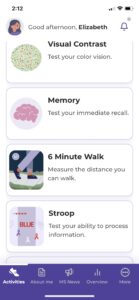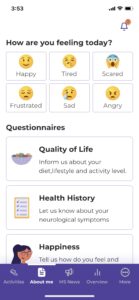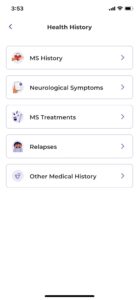It’s not a surprise that the time with your physician is precious, especially for those dealing with multiple sclerosis.
During an appointment with any healthcare provider, the clock is ticking to maximize the amount that can be accomplished in a limited time. According to national data, doctors spend an average of 18 minutes with patients. When you factor in a frequency of once or twice a year that MS patients see their neurologists (if at all), the importance of being prepared for the appointment is paramount.
Receiving optimal healthcare, especially for MS patients, is a two-way street. In a short timeframe, it’s up to the patient to give their healthcare provider a thorough update on their symptoms. Then, the physician must listen, absorb, distill, and recommend.
The Importance of Preparation for Your Appointment
At your appointment, your physician will ask you numerous questions to gain an overview of all the possible symptoms of your MS. If you are not well prepared for the visit, time may be up before you can express your concerns about new symptoms or current medications.
However, you will make the most of your visit with your healthcare provider if you are prepared and become the driver of the conversation. To cite a well-known adage called the 5 Ps of Preparation:
Prior Preparation Prevents Poor Performance
For MS patients, preparation maximizes your appointment’s value. Here are some tips for first-time and follow-up visits.
Your First Visit with a Neurologist
To start with, if it’s possible, bring someone close to you to the appointment. Another perspective on detected changes in your mood, behavior, or thinking… plus, two sets of ears can be very valuable!
For your first visit with a physician, here are tips on what to take to the appointment:
- Bring outside records. Please refrain from relying on your former healthcare provider to mail or fax them.
- Bring in any imaging, not just the written reports. The actual CD with your MRI or CT scans themselves are needed.
- In addition, write a timeline of each relapse (or new symptoms) you have experienced; briefly describe the problem (i.e., right arm weakness) and the date of its occurrence.
- Write a timeline of each treatment you have been on for MS, including steroids and IVIG; the start and, if ended, the end of the treatment; and the reasons for stopping treatment. Briefly note any side effects that you may have experienced from these medications.
- List all other non-MS-related medical problems (i.e., hypertension, surgeries).
- Include all medications you take for any reason (including supplements).
- Write down all the symptoms you are currently experiencing.
- Write down how MS has affected your mood, career, relationships, and goals.
- Share alternative or complementary therapies, such as chiropractic care, massages, etc.
- Include any other questions, including if there is a new medication you have heard of and want to learn more about.
A Follow-up Visit with Your Physician
If you are an existing patient and this is a follow-up, it is just as important to be ready for this visit because less time will be allotted than your first visit. Again, as suggested above, bringing someone close to you to the appointment can be helpful.
- If you have had an external evaluation for a second opinion or visited other doctors for your MS, bring the notes and possible imaging from that encounter.
- Describe any new symptoms you have experienced since the last visit. Specify when the symptoms occurred and how completely they resolved.
- Include all medications you are taking for MS and any other reasons (supplements included). It is essential, to be honest about how often you take your medications, even if it is not how the medication was prescribed. In addition, provide as much detail about any side effects of these medications.
- Write down how MS is affecting your mood, your career, your relationships, and your goals.
- Include any other questions, including if there is a new medication you have heard of and want to learn more about. Also, don’t hesitate to ask questions and learn about your risks. For example, if you’re reviewing MRIs, bloodwork, or even in-office assessment, ask how your latest results compare to your last.
Your Role in Driving Your Care
You are the most crucial factor in driving your care because your doctor can only give you the appropriate treatment if they have all the information needed. Yes, they will conduct a neurologic exam, but not all MS relapses can be detected on the exam. Further, the information you communicate in the appointment enables your doctor to tailor the exam to focus on the symptoms you describe.
How BeCare MS Link Can Help You Prepare for a Doctor’s Appointment
BeCare MS Link was designed to prepare you for a productive conversation with your healthcare provider. BeCare Link’s founders explicitly created the company to transform healthcare, as stated in our vision:
BeCare Link’s vision is to fundamentally change how patients and medical professionals understand and manage chronic neurologic disorders, remove biases, and find new treatments with better outcomes.
We believe that monitoring your disease is one of the most important things you can do to manage your condition and achieve better outcomes. Here’s how BeCare MS Link will inform your healthcare provider at your next appointment.
- The “Activities” section, with its 13 game-like activities, collectively measures all facets of your neurologic function. Its comprehensive results highlight any new abnormalities on your exam. By playing the activities periodically and before your appointment, your doctor can easily track your neurologic and cognitive progress. (See a screenshot of some of the activity below, starting with visual contrast).

Activities - The “About Me” questionnaires capture most of the information about your mood, career, relationships, and goals in a snapshot. As suggested above, your healthcare provider must have insight into your outlook on life. (See a screenshot below with the questionnaire that asks how your are doing today and questions about your quality of life).

About Me Questionnaire - The “Health History” allows you to put your MS history, treatments, and other medical history in one place. (See the screenshot below where you can add your Health History to BeCare MS Link).
-

Health History
Get started with BeCare MS Link. Download BeCare MS Link today:
On the Google Play Store here.
On The App Store here.
